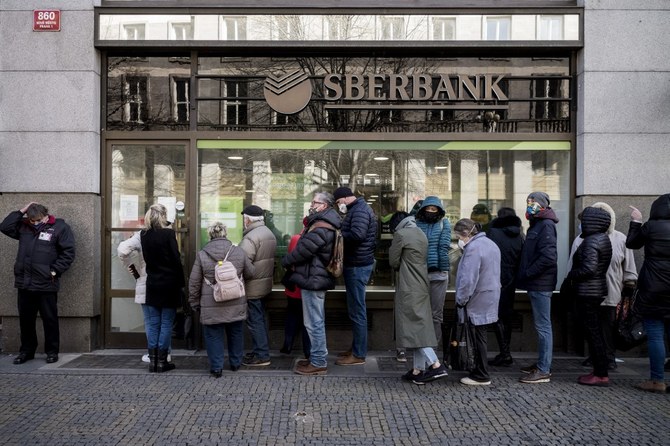RIYADH: British banking group HSBC, France’s Societe Generale and South Korean lenders are winding down relationships with a host of Russian banks, as they put Western sanctions against Russia into practice.
Highlights:
- The US, Britain, Europe and Canada announced new sanctions on Russia — including blocking certain banks’ access to the SWIFT international payment system — following Russia’s invasion of Ukraine.
-
The London Stock Exchange has suspended the membership of VTB Capital, which is owned by VTB. The suspension means VTB Capital can no longer trade on the LSE.
-
Two leading banks in South Korea confirmed on Monday that while they have not yet received specific guidelines from SWIFT, they stopped trade financing with at least seven Russian banks.
-
International departments of Chinese banks are likely to be monitoring their links with Russian banks, Han-Shen Lin, senior adviser for advisory firm The Asia Group, said.
-
MCSI said removing Russia from indexes is a natural step.
-
Russian oil tanker Linda is set to arrive at Sungai Linggi port on Malaysia’s west coast on Sunday. However, it is still unclear whether authorities in Malaysia plan to allow the ship to anchor.
-
The Ukraine crisis has rapidly emerged as a fresh risk for Asian factory activities.
-
Russian manufacturing activity shrank in February as new orders fell for the first time in six months.
-
Mexico’s President Andres Manuel Lopez Obrador said on Tuesday that Mexico will not take any economic sanctions against Russia for invading Ukraine.
The natural next step that we could potentially implement — we haven’t made any decision yet — but the natural next step might be to actually consider removing MSCI Russia or removing Russian securities from our indices
Dimitris Melas, MSCI’s head of index research and chair of the Index Policy Committee
TotalEnergies said it will no longer provide capital for new projects in Russia, according to reports by Reuters.
“TotalEnergies supports the scope and strength of the sanctions put in place by Europe and will implement them regardless of the consequences (currently being assessed) on its activities in Russia,” it said.
Elsewhere, shipping group Maersk said it will temporarily halt all container shipping to and from Russia in response to Western sanctions on Moscow following its invasion of Ukraine.
The move follows similar decisions by Singapore-headquartered Ocean Network Express (ONE), Germany’s Hapag Lloyd and Swiss-based shipping group MSC.
The suspension, covering all Russian ports, would not include foodstuffs, medical and humanitarian supplies, Maersk said.
In addition, Bloomberg reported that KPMG would cut ties with certain Russian clients subjected to recent sanctions.

Russian PMI
Russian manufacturing activity shrank in February as new orders fell for the first time in six months as businesses felt the impact of the COVID-19 pandemic, a survey showed on Tuesday.
The Markit Purchasing Managers' Index, PMI, fell to 48.6 in February from 51.8 in the previous month, slipping below the 50.0 mark that separates expansion from contraction for the first time since September.

India's SBI stops processing transactions
India's SBI stops processing transactions involving sanctioned Russian entities
The State Bank of India or SBI, India's largest public-sector lender has decided to stop processing transactions involving sanctioned Russian entities, according to CNBC.
According to the report, the bank will complete the transactions that are already in the pipeline, but they will refrain from processing new transactions that involve sanctioned Russian entities.
Moreover, SBI has also advised clients to be cautious while doing Russian transactions. However, no ban has been advised yet.
Banks measures
An advisory notice from HSBC, seen by Reuters, told staff how they should apply the new global sanctions on Russia.
Headed “Action Require” and dated Feb. 27, it highlights the fact that the UK Office of Financial Sanctions Implementation had authorized “The wind down of certain transactions involving VTB Bank and certain UK subsidiaries.” VTB, one of Russia’s biggest banks, is affected by British sanctions.

Mastercard's move
Mastercard Inc. said late on Monday it had blocked multiple financial institutions from its payment network as a result of sanctions imposed on Russia over Moscow’s invasion of Ukraine.
Mastercard will continue to work with regulators in coming days, the company said in a statement. It also promised to contribute a $2 million for humanitarian relief.
Mexican stance
Mexico’s President Andres Manuel Lopez Obrador said on Tuesday that Mexico will not take any economic sanctions against Russia for invading Ukraine, and he criticized alleged censorship of Russian state-sponsored media by social media companies.














